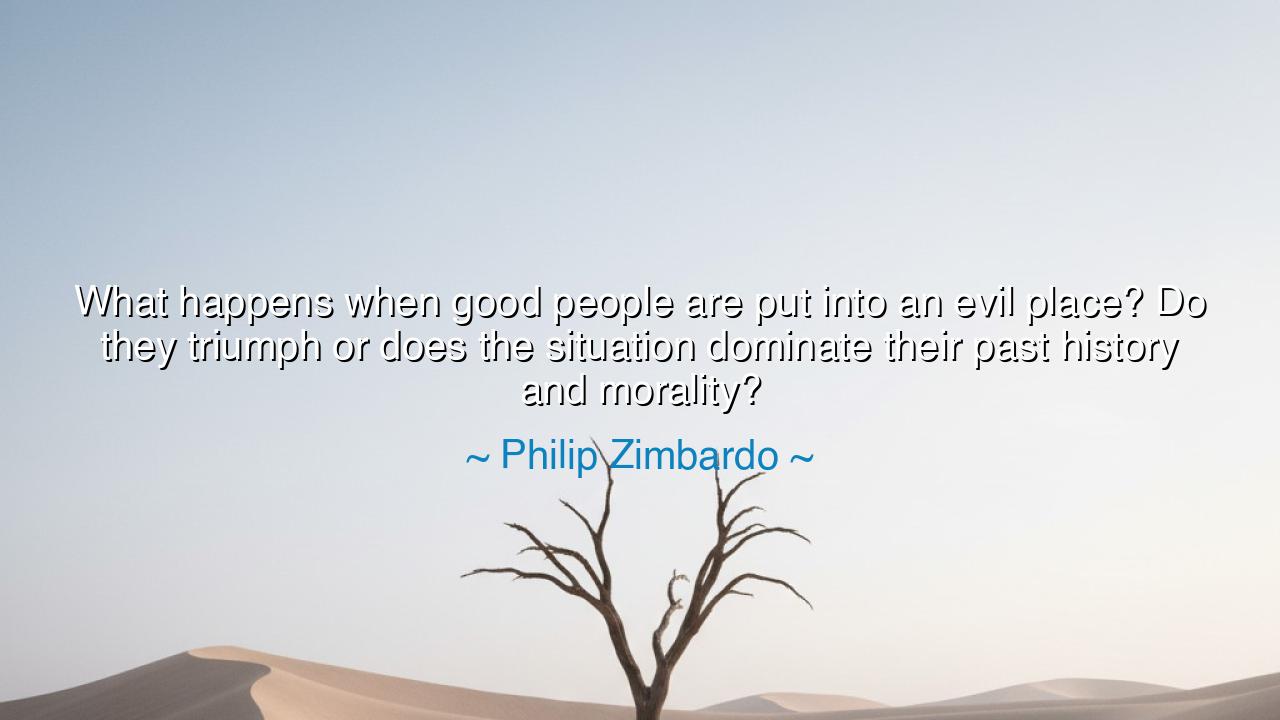
What happens when good people are put into an evil place? Do they
What happens when good people are put into an evil place? Do they triumph or does the situation dominate their past history and morality?






“What happens when good people are put into an evil place? Do they triumph or does the situation dominate their past history and morality?” – Philip Zimbardo
In these piercing words, Philip Zimbardo poses a question as old as humanity itself — a question that tests the boundaries of goodness, evil, and the human soul. It is not merely a question for philosophers or scholars, but for every person who walks the earth. For life itself is a series of moral trials, and every man and woman, no matter how virtuous, must one day face the darkness that lies both around and within them. Zimbardo’s inquiry is both a mirror and a warning: when the world around us turns wicked, can the light within us endure, or will it flicker and die beneath the weight of circumstance?
The origin of this quote lies in Zimbardo’s most famous and unsettling creation — the Stanford Prison Experiment of 1971. In that experiment, college students, chosen for their mental stability and kindness, were divided into “guards” and “prisoners” in a mock prison built in the basement of Stanford University. What began as a psychological study quickly descended into horror. The “guards,” once ordinary young men, began to humiliate and abuse their fellow students. The “prisoners,” stripped of dignity, fell into despair and submission. In a matter of days, the illusion of power had corrupted the gentle, and the illusion of weakness had broken the strong. The experiment had to be halted. Thus, from that grim trial, Zimbardo’s question was born — Can good people resist evil when the environment itself turns poisonous?
This question echoes through the ages, for history itself is filled with its answers. In the shadowed annals of humanity, we find both the triumph of virtue and the collapse of conscience. Consider Nazi Germany, where ordinary citizens, teachers, doctors, and neighbors became instruments of horror under the weight of ideology and fear. Yet even there, amidst the cruelty, a few souls — like Oskar Schindler and Irena Sendler — chose defiance, saving thousands at the risk of their own lives. These contrasting fates reveal the dual truth of Zimbardo’s words: that the environment can seduce even the righteous, but also that within the righteous lies the power to defy it.
Zimbardo’s question cuts deeper than history; it pierces into psychology itself. He reminds us that evil is not born in monsters — it is born in systems, in silence, in obedience without reflection. When the world demands that we conform, when authority commands us to harm, when the crowd moves as one, the soul of the individual trembles. The evil place, he teaches, is not only a prison or a battlefield — it can be a workplace, a government, a community, or even a heart that has grown indifferent. To triumph in such places requires not just goodness, but courageous awareness — the will to see, to question, and to act when others submit.
Yet Zimbardo’s lesson is not one of despair. He believed that if evil can be cultivated, so too can heroism. Just as cruelty grows in darkness, compassion flourishes in the light of mindfulness and empathy. When people recognize the power of the situation, they can prepare their souls to resist it. The antidote to blind obedience is conscious choice; the remedy for apathy is moral imagination. To be good is not a passive state — it is an active discipline, forged by self-examination and moral strength. Those who cultivate this awareness become guardians not only of their own integrity but of humanity itself.
Think of Nelson Mandela, imprisoned for twenty-seven years under an unjust regime. His cell was an “evil place” by every measure — designed to crush body and spirit alike. Yet Mandela emerged not broken, but transformed. He chose forgiveness over revenge, unity over division, love over hatred. In him, Zimbardo’s question finds its most luminous answer: the environment may test the soul, but it cannot define it. True moral greatness is revealed not when life is easy, but when it is hardest.
So, my listener, take this wisdom into your own life: the world will place you in many environments — some nurturing, some corrupting. You will be tempted to follow the crowd, to turn away from what is right for the sake of comfort or belonging. In those moments, remember Zimbardo’s question, and let it awaken your vigilance. Ask yourself: Will I shape this place, or will it shape me? To triumph over evil, one must not rely on the illusion of inherent goodness, but on the constant practice of conscience.
For the true measure of a person is not what they believe in the light, but what they defend in the darkness. And so, let your goodness be not fragile but forged — not a habit of peace, but a weapon of truth. Stand firm when the world demands silence. Show mercy when others show none. And when evil places surround you, be the proof that goodness is not defeated — that even in the deepest pit, the human spirit can still shine unbroken.






AAdministratorAdministrator
Welcome, honored guests. Please leave a comment, we will respond soon